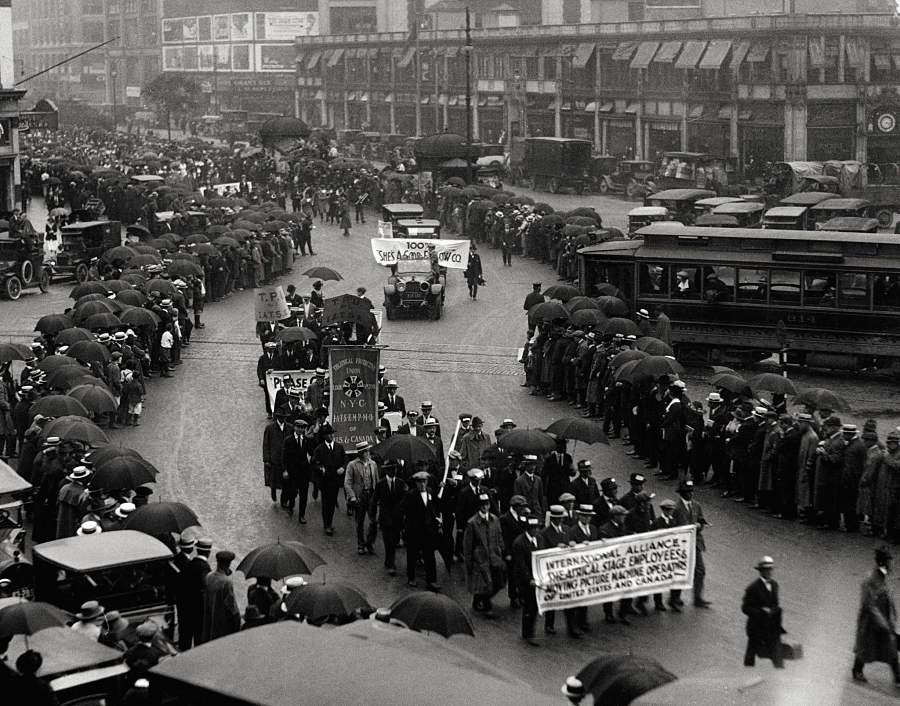1919 (105 years ago)
Actor’s Equity Association began its first strike as a union. Often required to rehearse without pay and purchase their own costumes, members fought for increased wages and fair working conditions. They also demanded recognition from the Producing Managers’ Association, which had announced in May that it would no longer use Equity contracts. On Aug. 7, Equity members met at the Hotel Astor ballroom in New York City to vote on the strike resolution that declared, “Until a satisfactory arrangement is made…we will not perform any service for any manager who is a member of the Producing Managers’ Association, or who refused to recognize our Association, or to issue its contracts.” The resolution passed without a single dissenting vote. The strike spread to eight cities, closed 37 shows, and prevented 17 openings, costing theatre managers $3 million. After 30 days, the PMA agreed to a five-year contract with Equity to end the strike. The new contracts set the eight-show-week maximum and guaranteed pay for overtime and rehearsal weeks.
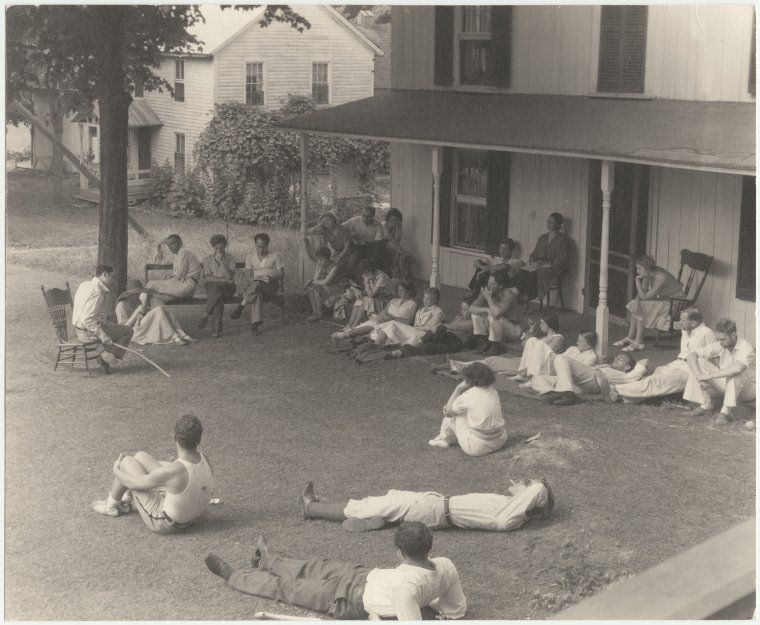
1934 (90 years ago)
Stella Adler joined the Group Theatre’s summer retreat in Ellenville, N.Y., on Aug. 7. After spending a month studying with Konstantin Stanislavski in Russia, Adler gave a lecture sharing her insights from the trip, which directly challenged Lee Strasberg’s teaching techniques. While Strasberg stressed the importance of emotional recall, Adler explained that Stanislavski focused on beginning with the given circumstances of the play to lead to truthful action. Strasberg maintained that his Method was superior, but some core members preferred Adler’s approach. Adler began to lead classes for other members of the Group, including Sanford Meisner and Elia Kazan, before leaving the company in 1937. She established her own acting studio in New York City in 1949, where she taught for several decades. Among her students were Marlon Brando, Robert De Niro, Warren Beatty, and Elaine Stritch. The Stella Adler Studio of Acting continues to train actors according to Adler’s techniques today.

1959 (65 years ago)
On Aug. 27, Ethel Merman returned to the lead role of Rose in the original Broadway run of Gypsy after missing seven performances due to a burst blood vessel in her throat. Ticket sales had dropped from $82,900 to $71,800 a week during her absence. Upon Merman’s return, composer Jule Styne sent her a telegram reading, “Welcome back in any key.” Indeed, to accommodate Merman’s vocal difficulties, her major musical numbers, including “Everything’s Coming Up Roses” and “Rose’s Turn,” were transposed to lower keys. Gypsy ran for 702 performances on Broadway, earning Merman a Tony nomination for Best Actress in a Musical. Much to her disappointment, however, Merman was passed over for the 1962 film adaptation of the musical.
1989 (35 years ago)
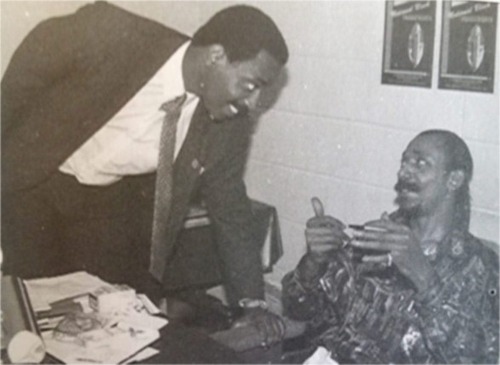
The inaugural National Black Theatre Festival was held in Winston-Salem, N.C., Aug. 14-20. Larry Leon Hamlin, then the artistic director of the North Carolina Black Repertory Theatre, founded the festival with the goal of uniting Black theatre companies across the country to share new work and discuss artistic and economic challenges. With a theme of “A Celebration and Reunion of Spirit,” the festival offered 30 different performances by 17 companies to 10,000 attendees. It also included conferences and workshops on the past, present, and future of Black theatre, makeup and lighting for Black actors, playwriting, and the business aspects of theatre. Renowned writer Maya Angelou served as the festival’s first chairperson, which drew such well-known guests as August Wilson, Oprah Winfrey, James Earl Jones, and Cicely Tyson. The festival, now called the International Black Theatre Festival, continues biennially in Winston-Salem and has grown to attract 65,000 people to over 120 performances. (The most recent one took place last week.)
2004 (20 years ago)
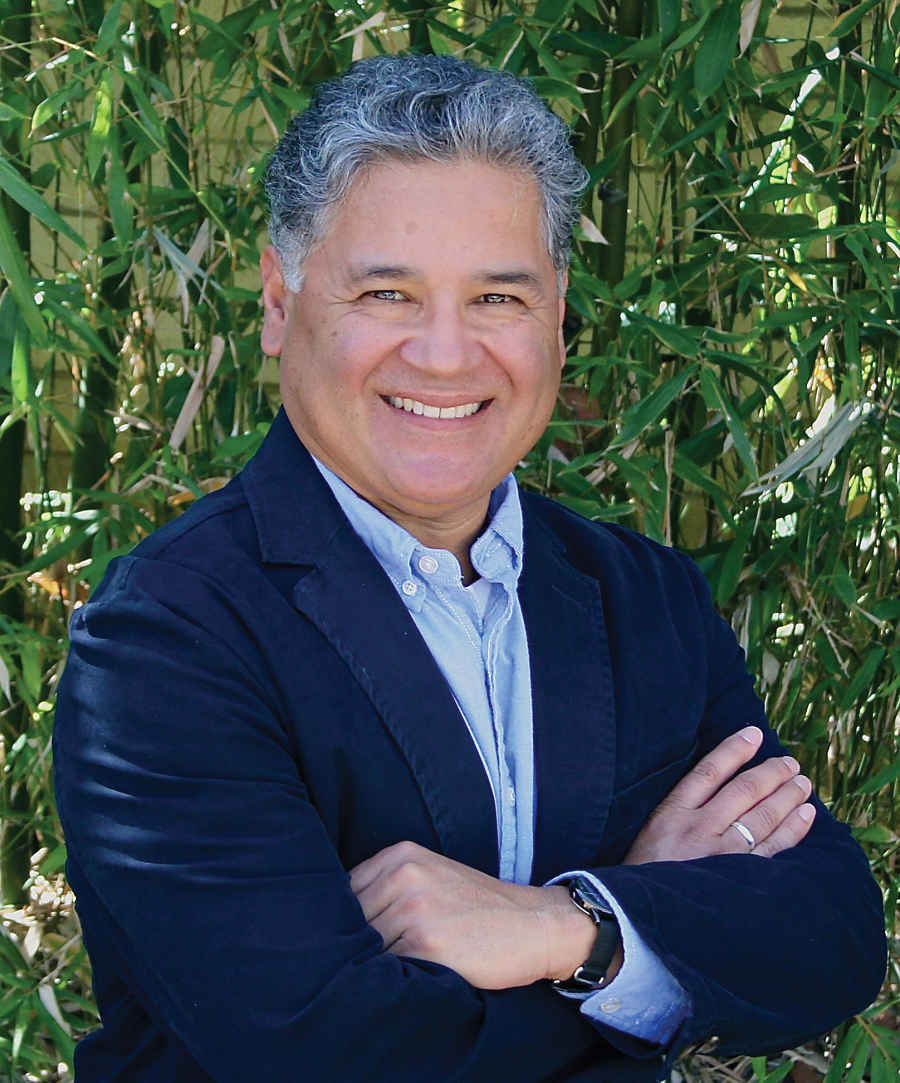
On Aug. 25, The Los Angeles Times reported the end of South Coast Repertory’s Hispanic Playwrights Project. Established in 1985 under the direction of José Cruz González, the HPP produced over 50 workshops of new works by Latine writers during its history, bolstering the careers of such playwrights as José Rivera, Nilo Cruz, and Quiara Alegría Hudes. It was the “longest-running and highest-profile Latino playwrights’ showcase among major regional theaters,”’ according to the Times. The end of the HPP was brought on by SCR’s decision to broaden its Emerging Artists Initiative to commission more full productions of plays from lesser-known playwrights. Producing artistic director David Emmes stated, “We’ll be able to broaden the focus to writers of other backgrounds, whether African American or Asian American or whatever. We don’t regard this as being able to serve Latino playwrights any less. We’re just serving them differently.” Nevertheless, previous HPP participant Luis Alfaro shared with the Times, “I’m saddened. People are going to lament the loss of it.”
2014 (10 years ago)
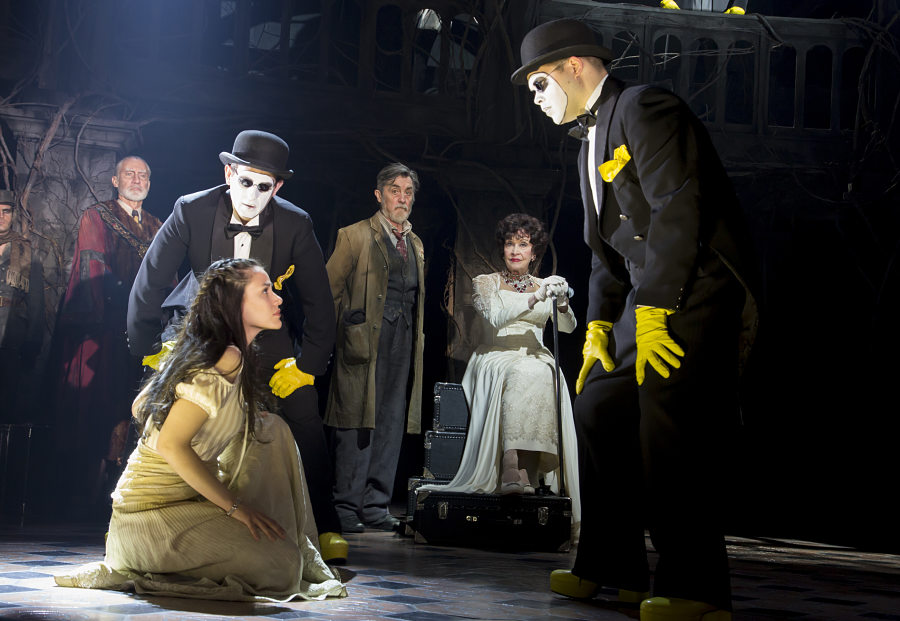
A new staging of the Kander and Ebb musical The Visit closed at the Williamstown Theatre Festival on Aug. 14. Originally developed in 2001 as a full-length musical, this 95-minute “one-act” version starred Chita Rivera, reprising her role of Claire Zachanassian, the world’s wealthiest woman, from previous iterations of the show in 2001 and 2008. Based on Friedrich Dürrenmatt’s 1956 play, the musical tells the story of Claire’s return to her financially depressed hometown to offer its residents money if they agree to execute her former lover. Though the musical’s creators had hoped for previous versions of the show to make it to New York, the Williamstown version of the musical finally brought those dreams to fruition, transferring to Broadway the next year and earning the production, including Rivera, five Tony Award nominations in 2015.

